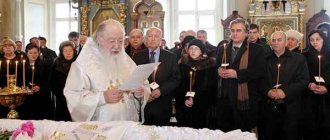Is a woman saved by childbearing?
Disputes about what it is - the path of the Orthodox family and the Orthodox woman - do not subside today, just as they have not subsided, perhaps, since the collapse of the traditional family and the emergence of the atomic family, when it is believed that for a proper family it is enough to give birth to one or two children and stop On this. “It was not Adam who was deceived; but the wife, deceived, fell into crime; however, he is saved through childbearing if he continues in faith and love and in holiness with chastity” (1 Tim. 2:14-15) - says the letter of the Apostle Paul.
Reviews that followed the recently published article by mother of many children Natalia Yaltanskaya “Is it honorable to have many children?” showed that the meaning of the words of the Apostle Paul remains unclear to many. With a request to clarify the meaning of these words, we turned to Archpriest Alexander Ilyashenko, chairman of the editorial board of our portal, father of 12 children, grandfather of 18 grandchildren.
Archpriest Alexander Ilyashenko
- Father Alexander, why, according to the word of the Apostle Paul, is a woman saved by childbearing?
Is this realistic these days, when it is so difficult for a large family to live? And does this mean that a working woman with, say, one or two children will not be saved? Does this mean that the number of children born affects salvation? Does this mean that a family to which God has not given children, as in the Old Testament, is considered sinful and has no hope of salvation? — Let us remember the first commandment given by the Lord to man: “And God created man in His own image, in the image of God He created him; male and female he created them. And God blessed them, and God said to them: Be fruitful and multiply, and fill the earth and subdue it, and have dominion over the fish of the sea [and over the beasts] and over the birds of the air [and over every livestock and over all the earth] and over every living thing that moves on the earth” (Gen. 1:27-28).
The Lord commanded families to have children, and from the first commandment it is obvious that there must be several children in a family so that the earth is filled with people.
The question is often asked - what if we don’t have children, then we won’t be saved? It is important to understand that salvation does not depend on the number of children - after all, not every family can have children, but depends on a person’s willingness to accept the will of God and not resist it . If for biological reasons, reasons beyond the control of the husband and wife, there are no children in the family, if the Lord does not give children, then this will not be a sin for them. We are talking about those families who resist having children by having abortions or deliberately preventing the birth of a new life.
We often hear the most sophisticated formulations and ways to argue for reluctance to accept another life into the family: “It is better to humbly raise one child than eight and be proud of it,” “It is better to raise one child well than ten poorly.” These are classic techniques for manipulating consciousness: the examples of families around us do not support the assertion that the parents of one child are guaranteed to grant his parents the acquisition of humility, and ten children are necessarily malnourished and do not receive an education. You cannot build other happiness on the misfortune of one . You cannot build the happiness of another child by killing one child. Due to the misfortune of one child, deprived by the will of his parents of a full-fledged family, brothers and sisters, it is impossible to give a truly harmonious upbringing. Why do parents think that communication with them and with teachers will have a more beneficial effect on the child than communication with younger brothers and sisters and caring for them?
In a family, parents learn a lot from their children, and the elders learn a lot from the younger ones. Anton Semenovich Makarenko, for example, a brilliant teacher who was able to raise dozens of the most difficult children, was a principled supporter of a large and friendly family. He believed that the “only child system” made the task of education extremely difficult . Even in a humble family, the only child turns into a prince or princess. His parents perceive him only as the only contender for happiness and success. “The concentration of parental love on one child is a terrible delusion. Parents, even if they wanted to, cannot get rid of harmful centripetal servility. In such cases, only the unnatural weakness of parental “love” can somewhat reduce the danger. But if this love has only normal dimensions, the matter is already dangerous: in this very only child lie all the prospects for parental happiness; to lose him means to lose everything. Its uniqueness therefore inevitably leads to a concentration of anxiety, blind love, fear, and panic. There are no brothers and sisters - neither older nor younger - therefore, there is no experience of care, no experience of play, love and help, no imitation, no respect, and finally, no experience of distribution, common joy and common tension . There is simply nothing, not even an ordinary neighborhood. In very rare cases, a friendly school community manages to restore the natural brakes on the development of individualism. This is a very difficult task for the school staff, since family traditions continue to operate in the same direction.”
A morally valuable need, Makarenko argues, can only grow from collective experience. As a standard, he takes a friendly and cheerful family with 13 children. All the children “amazed those around them with the amazing calmness of their characters. There was almost no crying to be heard in this overcrowded family. Even the youngest never gave such deafening concerts as happened in other families. What should parents who have only one child do? Makarenko offers one solution: take a child from an orphanage into your family and love him like your own. “Be sure to do this, no matter how difficult your financial situation may be. And most importantly, do not imagine that you have benefited him. It was he who came to the aid of your “skewed” family, saving them from a dangerous list.”
Let's look around us: everything that was created by the genius of our ancestors over the centuries is being mercilessly squandered by us today, people have lost the ability to live creatively, to live in a family. It is very difficult for the only child in the family to properly organize the life of his family: it turns out to be a vicious circle: women say that they have bad husbands, unreliable, who cannot be real heads of families, an only child is born in the family, who grows up to be an infantile egoist, and who is hardly can become a good father.
In the past, and even relatively recently, large families were common, and not exceptional, as they are now. Nowadays, in multimillion-dollar Moscow, there are only a few dozen families with ten or more children. But childless families are becoming the norm. In Old Testament times, not having children was considered a great misfortune and, moreover, a punishment for sins. To show how deeply and seriously they used to take creating a family, let’s turn to the classics. Here is an excerpt from the poem by A.S. Pushkin “The Bronze Horseman”:
Evgeniy sighed heartily and dreamed like a poet: “Getting married? To me? why not? It’s hard, of course;
But well, I’m young and healthy, I’m ready to work day and night; Somehow I’ll arrange for myself a humble and simple shelter.
And in it I will calm Parasha. Perhaps a year or two will pass - I’ll get a place, I’ll entrust our family to Parasha
And raising the children... And we will live, and so we will both reach the grave Hand in hand, And our grandchildren will bury us...”
O is the very last poem written by Pushkin. It was created during that period of his life when, after many years of fascination with the atheistic ideas of the Enlightenment, he deeply, with all his heart, accepted Orthodoxy.
In Pushkin’s time, young people treated marriage differently than their modern peers, although starting a family in the twenty-first century is just as difficult as in the nineteenth, and, indeed, in any era.
The first thing that distinguishes Pushkin’s contemporaries is their active attitude to life: “But well, I’m young and healthy, I’m ready to work day and night.” Nowadays, reluctance to have children is often explained by financial difficulties, but this is only an excuse. Material difficulties have always existed, and they can only be overcome by hard work - as the Apostle Paul said: “If anyone does not want to work, neither should he eat” (2 Thess. 3:10).
The second is a healthy, unpretentious attitude to life: “I’ll somehow arrange a humble and simple shelter for myself.” Then people were ready to be content with little; there was no unbridled craving for comfort. In the words of St. John Chrysostom: “The rich man is not the one who cares about great acquisitions and owns a lot, but the one who needs nothing.” A similar attitude towards wealth, but somewhat differently, was expressed by Robert Berne: “Wealth is a stamp on gold, and we ourselves are gold.”
Christian spouses must be ready, despite all difficulties, to build a Christian family, remembering that for each child God sends help according to His mercy. Of course, this means giving up some entertainment, travel, expensive purchases, etc. But God will provide what is necessary.
Third, the birth of children and grandchildren was perceived as something natural and desirable: “The grandchildren will bury us.” A calm, balanced attitude towards death is also striking. Nowadays, it is not customary to talk about death, since this topic can lead to unpleasant experiences. Christianity sees the purpose of life in the pursuit of holiness.
Having a large family is one of the forms of spreading Christianity . In contrast to the laws and morals that prevailed in the Roman Empire, the Christian community at the very beginning of its formation declared abortion a grave sin. In the Middle Ages, in almost all European countries, abortion was equivalent to the murder of a close relative and was punishable by death, which was eventually replaced by hard labor and imprisonment. This situation persisted until the first half of the 20th century, until attitudes towards abortion were radically revised. Abortion came to be seen as a powerful means of birth control.
Russia is on the verge of a demographic catastrophe. In 1999, the UN Population Fund compiled a forecast of the world's population for 2050. According to this forecast, Russia's population, which at that time was 147 million people, would be reduced by 26 million to 121 million people in fifty years. The Foundation's experts believed that the rate of population decline in our country would continue. However, this is an optimistic assessment, because the rate of decline will increase and, according to pessimistic estimates, the population of Russia may be halved in fifty years. During the same time, the population of the United States will increase by more than one hundred million and amount to 354 million people, that is, approximately three times the population of our country.
Nowadays, when social insurance and medical care are developed, it seems that we can hope for a prosperous and prosperous old age. However, this is not quite true. According to the same Foundation estimates, by 2050 the proportion of older people will increase sixfold. This means that those who are now twenty or thirty years old, those who do not want to have children, in fifty years will be left alone with their old age. After all, a sick and infirm person can be given a glass of water and medicine or a pillow can be straightened not by a bank account or property ownership, but by the gentle hands of a loved one.
Thus, the question must be raised not only about the possibility of reviving the family” and a large family, but about the extreme, urgent need. We must clearly understand that we are talking about the historical existence of our people.
In the twentieth century in Russia, the centuries-old way of life of the people was destroyed, the tradition of large families was interrupted, and it will now be very difficult to recreate it again. That is why, when getting married, modern young people, unfortunately, often find themselves completely unprepared to start a family, become parents, and raise children. This is not so much their fault as it is their problem.
The Lord gave the woman the gift of having children. The birth of a new life is embedded in the nature of a woman. And to act against your own nature is to act against the Lord God Himself.
Let's build a small chain of reasoning. The process of the origin of life, in accordance with modern scientific achievements, looks to us like a completely random process. Cell fusion occurs randomly at the molecular level, which is governed by the laws of quantum mechanics, which are also inherently random. We cannot even answer why life begins right now, and not a month earlier or a month later, suppose? We cannot name the gender, hair color, character, or any other characteristics of the unborn child - for us, people, this is a process independent of us and, in principle, absolutely random.
Well, now can we ask our dear reader: does he consider himself an accident? That is, can he imagine that it is not him, but his brother or sister? Or someone completely different? I think not, after all. Each of us considers himself an individual: I am, because I AM. This is already a fact of life. In fact, what is accidental for us is not accidental for the Lord God. And He sends exactly this person to these parents. Consequently, if we stand in the way of God’s providence, we simply become God-fighters. And if we accept as a cross (and this is a very heavy cross!) the calling to give birth to children, raise them, feed them, get food for them, we do what is pleasing to God. And since we do what is pleasing to God and bear our cross, it means that we are fulfilling God’s will and thereby being saved...
It is, of course, impossible to say that if a woman raises one child, she will not be saved. It's not for us to judge. The Lord God knows this, and a lot depends on the conditions of her life. There are families that really want children, but have no children. Or they want to have many children, but they have one child. This is all mysterious, hidden from us, this is the work of God’s providence. In Sacred history we see different examples. The parents of the Mother of God Joachim and Anna did not have a child for a long time. Their contemporaries condemned them for this - then not having a child was considered a shame and reproach.
In our country now it is considered a shame and disgrace to have many children, we have degenerated so much, we have gone so far from Orthodoxy, from faith, from Christ, that the natural becomes shameful among us, and on the contrary, the unnatural is welcomed. Therefore, such a negative attitude towards large families exists, but it is typical for non-church people, non-believers - it is on their conscience. Those who have a large family, they fulfill their duty to God, to their children, to each other. And they can live and enjoy life with a clear conscience, which, unfortunately, those who condemn them cannot be proud of.
Since the Lord arranges life and sends children, he also sends the necessary food, everything that is needed for life. I can confirm this from the experience of my family, where my mother Maria and I, with God’s help, are raising twelve children. I have never been smart, I have never had a lot of money. But all the children were always well-fed, dressed, and shod. Moreover, the people around you, even strangers, even non-believers, help very actively and kindly. It’s not for nothing that it has always been said: Russian people are kind people. This remains so, no matter how they try to mutilate and belittle the national character of our people. There are a lot of kind people. And if this were not the case, of course, raising such a family would be beyond the power of one. State assistance is also significant. Due to the fact that we have such a large family, we find ourselves in the public eye, private assistance also comes from abroad: people, for some reason sympathizing with the plight of our people, send some kind of assistance from their modest money to such large families , like ours. We are very grateful to all these people, known and unknown... But first of all, we are supported by the fact that our family is in the Church. I want to make a reservation that they are helping us not because they are the priest’s family. All my children were born before I was ordained to the priesthood. So I am quite an ordinary person.
The Church has always categorically condemned abortion and the obstruction of life .
Rule 21 of the Council of Ancyra : “Wives who conceived through adultery, and destroyed the fetus, and were involved in the preparation of destructive poisons, according to the previous definition, were forbidden to receive the Holy Mysteries until their death: and this is what they do. Looking for something more lenient, we determined that such people should undergo a ten-year period of repentance, according to the degrees established.”
Rule 91 of the 6th Ecumenical Council “We subject women who give medicine, causing miscarriage of the fetus in the womb, and who take poisons that kill the fetus, to the penance of a murderer.”
Rule 2 St. Basil the Great : “Whoever intentionally destroyed a fetus conceived in the womb is subject to the condemnation of murder. We do not have a subtle distinction between a fruit that is formed or one that is not yet formed. For here punishment is imposed not only for having been born, but also for slandering oneself: since wives very often die from such attempts. Coupled with this is the destruction of the fetus, like another murder, from those who deliberately dare to do this. However, it is appropriate not to extend their repentance until death, but to receive them into fellowship when they are ten years old; “Healing can be measured not by time, but by the way of repentance.”
Rule 8th St. Basil the Great: “...those who give medicine for the eruption of what is conceived in the womb are murderers, just as they accept infanticidal poisons.”
Breviary, rite of confession: “The food of the past, which a child could not do, or if the drink is false, would not conceive , or the poison of the past, or is satiated, and the unborn child is self-willed. And when it appears that you have done something, and the fiend willingly, there is a murderer, and he is prohibited as a murderer. If, involuntarily, due to some need, she has cast out her offspring, let her not take communion for one summer: but let the one who wears the old one, let her leave it, and let her be forbidden for six years, according to the sixtieth rule, hedgehog in Trulla. (...) If there are former poisons, or something else, the poison is false, and whoever does not give birth to children, as a murderer is prohibited.”
Today in Orthodox circles it is becoming common to adapt the rules of the Church to suit one’s desires. Indeed, in the Church there has always been the principle of oikonomia - leniency towards human weakness. And today there is an increasingly widespread tendency to elevate the requirements of oikonomia into the canon and rule of Christian life.
It is quite difficult to determine the boundary between what a person can do and what he cannot do: it is common for a person to follow a path that is easier for himself and look for compromises, choosing between the difficult path and the easier path, it is always much easier to choose the second path and find hundreds of reasons and excuses. Our ancestors were stronger and wiser than us, and we must imitate them. In order not to stray from the path of salvation and not make a false choice, it is necessary to rely on centuries-old tradition, fulfilling the commandment of the Apostle Paul: “Stand fast and hold fast to the traditions.”
– Father, you have 12 children, 18 grandchildren. Were you scared before the birth of your new baby? How to feed, where to live, what to wear?
- Of course, it was sometimes scary: the first child was fine, the second was normal, but with the third it was a little scary. But mother waited for each baby with great enthusiasm, and this feeling of joy was passed on to those around her. The children also looked forward to the arrival of the new baby and often asked when another baby would finally be born. I saw that mother was not afraid, and over time this fear passed on its own, and a feeling appeared that everything was working out. And everything really worked out over time. We had difficult situations, but there were no dead-end situations where we couldn’t break through.
– Remember, on our portal “Orthodoxy and the World” some time ago we conducted a survey of large families: we asked them to tell us whether people in their lives have noticed that if God gives children, then he also gives for children. The vast majority of parents with many children answered that this is exactly what happened in their lives: with their first children there were often very difficult living conditions, and as the children were born, all the problems were unexpectedly solved. Was this the case in your life?
- Yes, that’s how it was with us. The most difficult time is having three children. Both materially and psychologically. In the future, it becomes clear what is necessary, what can be done without, how to organize time, how to distribute expenses. When Masha was expecting her fourth, we were able to buy a house in the village, and there was a promotion at work. In those days there were quite substantial child benefits. With our fifth child, we moved to a larger apartment; during the difficult times of perestroika, we received help from Germany. Friends helped with extra work.
Of course, in the Soviet years it was possible to get an apartment, although not immediately, large enough for a normal life; now this is much more difficult.
- However, you also had a time when you lived in a two-room small apartment and you even had to nail a shelf so that you could put a baby... Then - all your family children have large families, that is, despite modern difficult living conditions, they still have They already have very large families. In such a situation, it’s so easy to blame the state for everything and limit yourself to one child... What gives your children confidence?
Parental love multiplies with each newly born child. A person can be a full-fledged person only when he loves someone, when he knows how and can love. If he doesn’t love anyone, then he is the most unhappy of people, dooming himself to emptiness and loneliness. People steal happiness from themselves when they decide to live without children, as they say today: “for themselves.”
Our children grew up in an Orthodox family, in an environment where it was natural to have a large family; they saw that we were not the only ones, that many friends had large families. And it turned out that, as in the proverb “If God gives children, then he also gives for children,” everything is working out for them, including housing.
The standard of life for a Christian is life according to the commandments of the Lord. If among the people marriages are depleted of children, then this is a sign of deep moral depravity.
(G. I. Shimansky “The Christian virtue of chastity and purity”)
Afterword
In 2000, Father Alexander’s first book, “Royal Crowns, Crowns of the Cross,” was published. It contains the following words: “I am often asked how my wife and I expect to provide education for so many children, when in other families parents are not able to ensure that one child goes to college. Yes, the fact of the matter is that we do not rely on ourselves, but rely on God’s help, and the Lord does not abandon us with His mercy . The children go to college, their personal lives are slowly settling down,” Father Alexander tells readers. More than eight years have passed, the Lord has not disgraced the hopes of Father Alexander and Mother Maria: six children already have their own families, all families with many children. The eldest daughter Tatyana graduated from the Pedagogical University, a candidate of philological sciences, she has four children, Deacon Philip is a graduate of the Faculty of History of Moscow State University, a candidate of historical sciences, the father of six children, Ivan is a programmer and layout designer, he has three children, Varvara is a philologist - a graduate of St. Tikhon's university. Alexandra, having received an incomplete higher medical education, entered the Pedagogical University at the Faculty of Philology and has already completed her first year with excellent marks, she has 5 children, Daniil is a pediatrician, Volodya is a student at the Faculty of History of Moscow State University, Masha is a student at the Faculty of Soil Science, Seryozha is a student mathematician, Olechka is still a schoolgirl.
Father Alexander has a large parish, a friendly community, all parishioners take an active part in rebuilding the parish community, all parish families are inspired by the amazing example of the family of Father Alexander and Mother Maria.
Feeling of despair
Alford notes that when, after the Fall (see Genesis 3:16), God pronounces the consequences of the curse to the devil, woman and man, the punishment of childbearing goes to the woman: “I will multiply thy sorrow in thy pregnancy; in sickness you will give birth to children.”
Let's stop and imagine childbirth in the pre-medical era. No hygiene, painkillers, stitches, cesarean section, antibiotics, and, often, no chance of survival during childbirth. A huge number of women died during childbirth, and an even larger number suffered throughout their lives due to postpartum complications, the inability to give birth again, not to mention the ability to have an intimate life.
In other words, then, even more than now, childbirth seemed like a curse from God, and what to think, given that this curse could last the rest of your life? It is not surprising that women fell into despair and thought that they were rejected by God. He cursed, did not save.
And Paul responds to this despair with the hope of the Gospel. The curse will not prevail. The pains of childbearing, even if they last a lifetime, are not God’s last word to women. There is a point of salvation set aside for them in God's plan. God ordained woman to be a joint heir of grace (1 Peter 3:7)
Here's how Henry Alford sums up his interpretation:
The woman's curse for her sin was pain during childbirth (Genesis 3:16). Childbirth is a process that gives rise to a curse. What then is the good promise for her in this verse? Not just deliverance from the severe consequences of the curse, not just the promise of the possibility of having children. No, the Apostle Paul uses the word “saved” to mean eternal salvation, analogous to salvation from fire (see 1 Corinthians 3:15).
Just as a man will be saved from fire, finding himself in it, passing through it, as through a grave consequence of sin, so a woman will be saved by experiencing childbearing, as a punishment, an obstacle, but not a means to salvation (Alford’s Greek Testament: exegetical and critical commentary).
Word of salvation
I would like to add a few words here about the application of the analyzed verse. Even if modern medicine can eliminate most pain and postpartum consequences, every mother knows that sin permeates everywhere - in our marriage, in childbirth, in raising a child. And this is enough for a woman to fall into despair.
I think a good application of this verse would be:
God does not like pain and suffering. They are not the last appeal to us. He offers us salvation. His word will be with us in all our troubles to save, protect and give us a future and hope. All this is through faith in Jesus Christ.
Author - John Piper / translation - hristiane.ru
Donate Last: 02/28. Thank you!
Subscribe: Telegram • Facebook • • • Twitter • Instagram • Youtube
The curse will be lifted
I would summarize the output this way:
Although today and throughout the history of mankind every woman feels pain during childbirth, and after that various postpartum traumas remain with her for the rest of her life, I urge all Christian women not to despair. God's calling to you is hope, not a curse. God has planned salvation for you, not destruction.
Just as a man will be saved despite the weariness of labor (see Genesis chapter 3 verses 18-19), millions of women will find salvation even after experiencing the pain and inconvenience of childbirth. The path of salvation for a Christian woman is the same as the path of all other saints: to remain in faith, love, holiness and prudence.
Jesus Christ is the Savior who took our curse upon Himself (see Galatians 3:13). The sting of the curse was destroyed. It can no longer destroy us. Faith in Jesus is a connection with the Savior. Love, holiness, self-control - these are the real fruits of such faith.
On the last day every curse will be lifted and every wound will be healed. And this too is salvation through faith in Christ.









